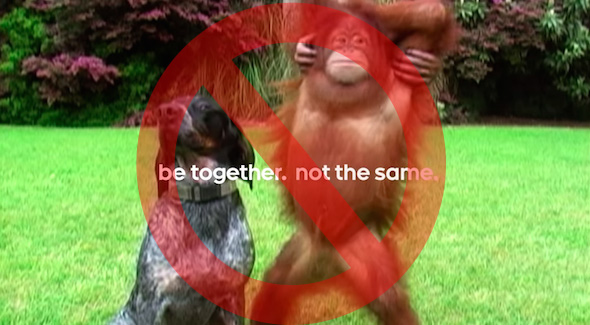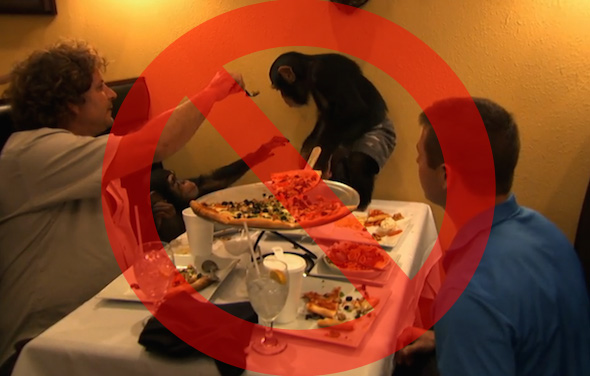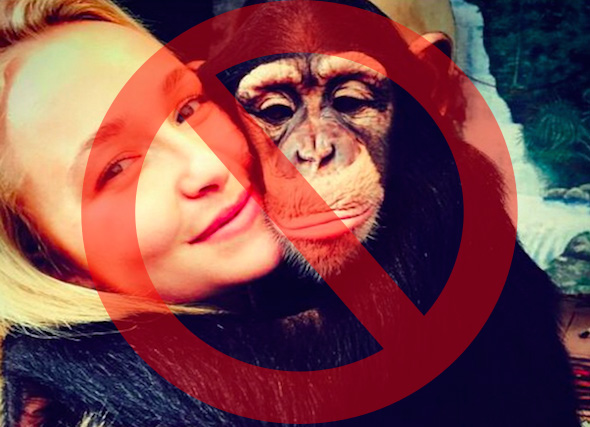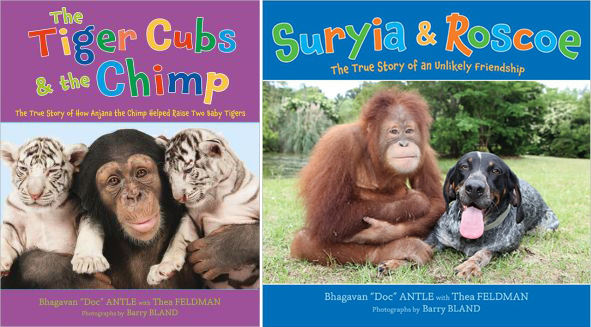If you’re reading this, you probably have a love of animals, so when you see videos and photos of animals that make you laugh or melt your heart, you want to share them. Us too! Unfortunately, there’s often an ugly truth behind “cute” videos and photos.
A prime example is the slow loris videos that have circulated. The slow loris is such an adorable primate, and the videos seem to show these animals in a happy environment. But the ugly truth is that these endangered animals are part of the illegal exotic pet trade and the behaviors that may look cute to us are actually signs of fear and stress.
A new example is the Android commercial called “Friends Furever” promoting unlikely animal friendships. Upon first glance, the video clips seem like a heartwarming example of friendship breaking the species barrier, and your first instinct might be to share the commercial with other animal lovers. The ugly reality is that exotic animals such as the orangutan and the elephant seen in the commercial are trained at a very young age (when they should be with their mothers) to pose for photos with humans, and they are forced into relationships with other species for the sole purpose of creating and circulating “cute” photos and videos. The orangutan, Suryia, and the elephant, Bubbles, both live at Myrtle Beach Safari in South Carolina.
Myrtle Beach Safari, operated by Bhagavan (Doc) Antle, has a history of repeated animal welfare violations. Masked behind what they claim is a sanctuary preserve, the facility regularly exploits their wild animals for a variety of media productions and endangers the public by offering “hands-on” experiences and traveling shows. Apes are wild animals, and without proper enclosures and respect for their true nature, many have attacked and brutally mauled humans.
Just last summer, two young chimpanzees were taken to a movie theater to garner attention for the Safari. Recently, these same chimpanzees, Vali and Sugriva, were seen on an episode of A&E’s Wild Transport, where they were taken to a crowded restaurant—creating yet another public safety risk just for a glorified publicity stunt.
In that episode, Vali and Sugriva were being transported to a facility in Miami called Jungle Island, where they have special “hands-on” encounters with guests, sometimes celebrities, which gains even more attention for the Safari.
After speaking with Eyes on Apes and other advocacy groups about the issues surrounding Vali and Sugriva’s appearance in the show, the A&E Network decided to cancel the series—setting a precedent for other companies to follow.
Unfortunately, actress Hayden Panettiere very recently posted a photo to her Twitter account of her holding the chimpanzee Vali at Jungle Island.
Images like this with humans in contact with chimpanzees perpetuate the misunderstanding about chimpanzees’ true nature and encourage the exotic pet industry.
Vali, Sugriva, Suryia, and dozens of other exotic animals under Antle’s care are living at a romanticized roadside zoo. These animals deserve better—they deserve a true sanctuary home where they can live out their lives without being shuffled from one exhibition to another.
Companies such as Pfizer have responded favorably when they learned the truth about Myrtle Beach Safari. We’d like to call upon Android to make the same compassionate decision.
We urge you to write to Android and Hayden Panettiere and ask that they remove any material that misinforms the public and promotes the Safari.
You can leave comments on Android’s Facebook page or the post of the Friends Furever video, reply to their tweet on Twitter about the commercial, and reply to Panettiere’s photo on Twitter as well. You can also email Panettiere, c/o her publicist, at [email protected] . We’ve provided examples of what to write below.
In the big picture, when you see “cute” photos and videos of animals, ask yourself where these animals came from, where they are living now, what their future is likely to be like, and if the behaviors you see are the choice of the animal. You might be able to search and find the answers to these questions, or you might be left with more questions. When in doubt, don’t hit that share or forward button, because you might just be perpetuating exploitative, dangerous, or illegal activity.
Sample Facebook comment to Android:
I was disappointed to see that your new “Friends Furever” commercial promotes pseudo-sanctuaries such as Myrtle Beach Safari, where “unlikely animal friendships” like Suryia the orangutan and Roscoe the dog are forced after exotic animals are taken from their mothers at a very young age. In the wild, baby orangutans stay with their mothers until they are eight years old, so you can imagine how important that bond is for them. Not only does the Safari mislead the public into believing that these are “cute” relationships, but they also regularly put people at risk with public exhibitions of wild animals and exploit the animals for entertainment—things a reputable sanctuary would never do. This glorified roadside zoo has also had numerous animal welfare violations (EyesOnApes.org/suryia).
You’re not the first to be duped by this pseudo-sanctuary. Pfizer chose to alter a Robitussin commercial that was originally aired using Suryia, replacing the live animal scenes with realistic, high-tech computer generated images after they learned the truth behind the Safari. I urge you to make the same decision involving the clips of the exotic animals in your commercial. Thank you for your consideration of my comments on this urgent matter.
Sample Tweet to Android:
@Android please change #AndroidBFFs ad to exclude clips of animals in roadside zoos. Robitussin did it before! See more at EyesOnApes.org/suryia
@Android “cute” #AndroidBFFs animals reveal an ugly truth. Don’t glorify roadside zoos! See more at EyesOnApes.org/suryia
*Sample email to Hayden Panettiere:
Dear Ms. Panettiere,
I know that you are an animal lover and have spoken out about the dolphin slaughter in Japan. I applaud you for your passion! Because of your obvious concern for animals, I was shocked and disappointed to see a photo of you and a baby chimpanzee named Vali circulating social media. You should know that when people see you holding a baby chimpanzee it perpetuates the cruel pet and entertainment industries. Baby chimpanzees belong with their mothers, and they shouldn’t be shuffled around to exhibitions or hands-on encounters. Vali was reportedly purchased from an animal breeder, and he belongs in a true sanctuary where the focus would be on his needs, not the desire of the public to have photo-ops with him. I urge you to please remove the photo from your social media and pledge to never participate in hands-on experiences with captive wild animals again.
Sample Tweets to Hayden Panettiere:
@haydenpanettier please remove the photo of you and Vali the chimp. He deserves better! Learn more EyesOnApes.org/vali
@haydenpanettier love chimpanzees like you love dolphins – don’t participate in their exploitation! EyesOnApes.org/vali
RT! Tell @haydenpanettier to remove photo of her w/ chimp – they’re wild animals & shouldn’t be used for publicity. EyesOnApes.org/vali
Lastly, please share this alert with friends and family. Change can only happen with more awareness! Thank you for speaking up for apes in need.
*If you email Hayden, please remember to BCC [email protected] for tracking purposes. Thank you!!









